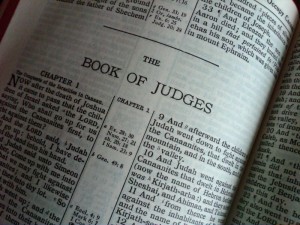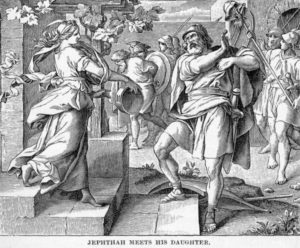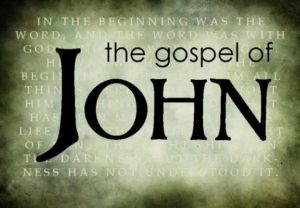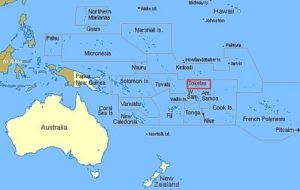APRIL 30 TODAY’S READING:
Judges 11-12:15; John 1:1-28; Psalm 101:1-8; Proverbs 14:13-14
OLD TESTAMENT READING; JUDGES 11- 12:15
The Book of Judges anticipates the gospel’s surprising means of deliverance that is yet to come.
 God raises up some unlikely human instruments to provide deliverance from the enemies of His people: Ehud was from the tribe of Benjamin (‘ben’ ‘htayemini’- meaning ‘son of my right hand’) and was ‘left-handed’ (‘itter yadyemino’ literally meaning ‘handicapped in the right hand’). Shamgar used an ox-goad rather than a sword or spear to defeat the enemy. In a male-dominated society, God used Deborah to lead Israel to victory and a Gentile woman, Jael, to slay the enemy’s commander, Sisera, with a tent peg. Gideon would have been voted least likely to lead as he was the least of the least clan in Manasseh. Jephthah was the disowned, cast-off son of a prostitute.
God raises up some unlikely human instruments to provide deliverance from the enemies of His people: Ehud was from the tribe of Benjamin (‘ben’ ‘htayemini’- meaning ‘son of my right hand’) and was ‘left-handed’ (‘itter yadyemino’ literally meaning ‘handicapped in the right hand’). Shamgar used an ox-goad rather than a sword or spear to defeat the enemy. In a male-dominated society, God used Deborah to lead Israel to victory and a Gentile woman, Jael, to slay the enemy’s commander, Sisera, with a tent peg. Gideon would have been voted least likely to lead as he was the least of the least clan in Manasseh. Jephthah was the disowned, cast-off son of a prostitute.
The fallibility and depravity of mankind are vividly portrayed in these dark days of spiritual declension in the Promised Land described in the Book of Judges. When the Messiah arrives, an apostate Judaism will exist in an enemy-occupied Palestine. He will not be recognized and received by His own. He will appear to be one who is at a great disadvantage, presumed to have had an ignoble birth in Bethlehem, being raised in the slums of a disreputable town (‘Can anything good come out of Nazareth?’), a prophet without honor among those to whom he was familiar, betrayed by friends and handed over to Gentiles. Yet He will defeat the enemy in His death, and in His resurrection, accomplish a supernatural deliverance.
THE SIXTH CYCLE OF DELIVERANCE- JEPHTHAH
 God recognized that His people had given themselves to idolatry more deeply than they had realized. He was not quick to answer their cries. When they finally repented of their sin, it took some time for them to call for the Deliverer He had chosen.
God recognized that His people had given themselves to idolatry more deeply than they had realized. He was not quick to answer their cries. When they finally repented of their sin, it took some time for them to call for the Deliverer He had chosen.
Jephthah was the valiant warrior that no one really wanted on their team until the Ammonites proved to be an enemy too difficult to handle without a skilled leader. His own half-brothers despised him because his mother was a prostitute. Because of his shameful birth, he was driven from his father’s household and denied an inheritance. Yet when it was perceived that victory could come no other way, his brothers requested his skills in the battle and pledged that they would submit to his leadership with the LORD as their witness (11:10-11).
Jephthah proves to be a godly leader. With tactful diplomacy, he seeks to avoid an unnecessary war by sending messengers to carefully recount the historical record in order to expose the illegitimacy of the Ammonite claim that the Israelites had taken their land.
But the sons of Ammon have their hearts set on war and disregard Jephthah’s message.
The Spirit of the Lord comes upon Jephthah. He crosses the Jordan to the Ammonites. He makes a vow that if the Lord delivers the Ammonites into his hand, whatever comes out of the doors to meet him when he returns from victory, he will offer to the Lord.
The words indicate that he was anticipating offering one of his livestock. The Lord does deliver the enemy into his hand. Instead of one of the farm animals coming out to greet him, his only child, his beloved daughter, comes out.
 Scholars give three strong arguments that Jephthah fulfilled his vow, not by putting his daughter to death, but by setting her apart for service to God, never allowing her to marry. Although practiced by the Moabites, human sacrifice was forbidden in the Mosaic law (Leviticus 18:21; 20:1-5). Even during this period of spiritual declension, the Israelites abhorred such abominations. No Levitical priest would have assisted in such a sacrifice. Judges 11:39 does not say that she died, but that she returned to her father, and remained a virgin, never marrying.
Scholars give three strong arguments that Jephthah fulfilled his vow, not by putting his daughter to death, but by setting her apart for service to God, never allowing her to marry. Although practiced by the Moabites, human sacrifice was forbidden in the Mosaic law (Leviticus 18:21; 20:1-5). Even during this period of spiritual declension, the Israelites abhorred such abominations. No Levitical priest would have assisted in such a sacrifice. Judges 11:39 does not say that she died, but that she returned to her father, and remained a virgin, never marrying.
The incident reminds us that a vow should be taken seriously. Jephthah did not imagine that he would be deprived of grandchildren when he made this promise.
THE SHIBBOLETH
Jephthah is a man whose excellence in character stands in contrast to many of his contemporaries. The Ephraimites are insulted that Jephthah did not ask them to join the battle against the Ammonites. They boastfully threaten that they will burn down Jephthah’s house with him in it. The truth is that the Lord gave the victory to Jephthah without the aid of the Ephraimites.
Jephthah patiently endures their foolishness and attempts to reason with them. When he and his people were previously in conflict with the Ammonites, the Ephraimites refused to give them help. They had proved to be unreliable and unwilling in the past. Why should he appeal to them again?
The Ephraimites are unrepentant of their arrogant threat to destroy Jephthah. Gilead goes to war and soundly defeats Ephraim. When the surviving Ephraimites want to cross the Jordan River to return to their home territory, the Gileadites take control of the fords in an attempt to stop them.
 When they ask those trying to cross the river if they are fugitive Ephraimites, they deny it. The Gileadites test their claim by asking them to pronounce the word ‘shibboleth’, which in Hebrew means an ‘ear of corn’ or ‘stalk of grain.’ Ephraimites could not pronounce the ‘sh’ sound as in ‘shoe.’ Their pronunciation would sound like ‘sibboleth’. Their inability to pronounce this word would prove that they were from Ephraim, even though they might deny it (12:6).
When they ask those trying to cross the river if they are fugitive Ephraimites, they deny it. The Gileadites test their claim by asking them to pronounce the word ‘shibboleth’, which in Hebrew means an ‘ear of corn’ or ‘stalk of grain.’ Ephraimites could not pronounce the ‘sh’ sound as in ‘shoe.’ Their pronunciation would sound like ‘sibboleth’. Their inability to pronounce this word would prove that they were from Ephraim, even though they might deny it (12:6).
Today we call any word or custom a ‘shibboleth’ whose variation in pronunciation or style can be used to differentiate members of different social or regional origins. A shibboleth is not easily imitated by outsiders.
In George Stimpson’s “A Book About a Thousand Things,” the author notes that, in Second World War, Japanese spies would often approach checkpoints posing as American or Filipino military personnel. A shibboleth such as “lollapalooza” would be used by the sentry, who, if the first two syllables come back as ‘rorra’, would “open fire without waiting to hear the remainder.”
Jephthah judged Israel for 6 years. He was followed by Ibzan of Bethlehem. He is known for nothing other than his thirty sons, his thirty daughters, and thirty daughters-in-law brought in from outside. He judged Israel for one year longer than his predecessor,
Elon, the Zebulunite, served as a judge for ten years.
Abdon judged for 8 years and is known for the family parade of forty sons, thirty grandsons who rode seventy donkeys.
NEW TESTAMENT READING: John 1:1-28.
 The Apostle John is the author who contributes more writings to the New Testament than any other, next to the Apostle Paul (although Luke contributes a greater word count than any of them). There is abundant evidence that John, the son of Zebedee, the brother of the disciple James, is the author of this gospel. He is self-effacing in his style. As an eyewitness to the events, he mentions the names of others with great accuracy, but he himself sometimes remains unnamed (John 13:23; 20:2). It would be highly unusual for anyone else to write this account and not name such a prominent disciple as the Apostle John.
The Apostle John is the author who contributes more writings to the New Testament than any other, next to the Apostle Paul (although Luke contributes a greater word count than any of them). There is abundant evidence that John, the son of Zebedee, the brother of the disciple James, is the author of this gospel. He is self-effacing in his style. As an eyewitness to the events, he mentions the names of others with great accuracy, but he himself sometimes remains unnamed (John 13:23; 20:2). It would be highly unusual for anyone else to write this account and not name such a prominent disciple as the Apostle John.
John’s gospel is the last of the four gospels to be written. Written in the last decade of the first century, the apostle states his purpose for writing and then selects key events, “signs” signifying that Jesus is the Christ, the Anointed One, the Son of God.
John 20:30-31 (NASB) 30 Therefore many other signs Jesus also performed in the presence of the disciples, which are not written in this book; 31 but these have been written so that you may believe that Jesus is the Christ, the Son of God; and that believing you may have life in His name.
Rather than writing a chronological narrative, John assembles eight signs of the deity of Christ and assumes that his readers are already familiar with these events, as most of them were recorded in the previously written Synoptic Gospels (Matthew, Mark, and Luke).
John knows that apart from faith in Christ, there is no hope of human beings experiencing the gift of eternal life. Apart from Christ, the door to heaven is shut. Jesus is the Open Door for those who trust in Him. This theme is repeated throughout the gospel:
John 3:5 (NASB) 5 Jesus answered, “Truly, truly, I say to you, unless one is born of water and the Spirit he cannot enter into the kingdom of God.
John 3:14-15 (NASB) 14 “As Moses lifted up the serpent in the wilderness, even so must the Son of Man be lifted up; 15 so that whoever believes will in Him have eternal life.
John 3:18 (NASB) 18 “He who believes in Him is not judged; he who does not believe has been judged already, because he has not believed in the name of the only begotten Son of God.
John 3:36 (NASB) 36 “He who believes in the Son has eternal life; but he who does not obey the Son will not see life, but the wrath of God abides on him.”
John 5:39-40 (NASB) 39 “You search the Scriptures because you think that in them you have eternal life; it is these that testify about Me; 40 and you are unwilling to come to Me so that you may have life.
John 8:24 (NASB) 24 “Therefore I said to you that you will die in your sins; for unless you believe that I am He, you will die in your sins.”
John introduces Jesus, not from his birth, but from the beginning, before Genesis 1:1. The eternal pre-existence of the Son of God is declared:
John 1:1 (NASB) 1 In the beginning was the Word, and the Word was with God, and the Word was God.
 John succinctly declares the Deity of Christ and His vital role in the Trinity as ‘the Logos,’ the full thought of God expressed. He makes the incomprehensible intelligible, the inaccessible accessible, the invisible visible. Jesus not only delivers the Word; He is the Word of God.
John succinctly declares the Deity of Christ and His vital role in the Trinity as ‘the Logos,’ the full thought of God expressed. He makes the incomprehensible intelligible, the inaccessible accessible, the invisible visible. Jesus not only delivers the Word; He is the Word of God.
John declares Jesus as co-equal with the other members of the Trinity, in face-to-face fellowship (v.2). He is the creator and the indispensable source of the life that was to be the Light of mankind. Without His life, there is no true light.
In verse 5, we are introduced to unbelief.
John 1:5 5 The Light shines in the darkness, and the darkness did not comprehend it.
John the Baptist is introduced in the context of God’s initiative to turn people’s hearts from darkness to Light, from unbelief to belief, that they might have life in Christ. He was a witness to that Light.
The world does not, and cannot, comprehend (v.5), know (v.10), or receive (v.12) that Light apart from the work of God’s sovereign saving grace.
Those who believe are born again (John 3:3), born into God’s family, not through their natural heritage (blood), their natural prowess (their will), or the natural persuasive influence of others (will of man), but by an act of God (John 1:13).
John’s record of the Nativity is summed up in one verse.
John 1:14 14 And the Word became flesh, and dwelt among us, and we saw His glory, glory as of the only begotten from the Father, full of grace and truth.
Jesus is the fulfillment of all that was spoken of in the Tabernacle and the Laws of the Sanctuary. He “tabernacles” among us. We see His glory- His perfection. We see God the Father’s verdict upon His perfection in that His glory continually abides. God the Father is the source and affirmer of His glory.
John records the title of the first person of the Trinity as ‘Father’ 120 times. The Greek word for ‘life’ is found 37 times. In 17 of those occurrences, it is paired with the Greek word for ‘eternal.’
John testifies that a greater revelation of God’s righteousness has come in Jesus. That revelation causes the knowledge of God’s grace and truth to shine (v.17).
Jesus answers our questions about God, not only by what He said but by what He did and does. He is the full exposition of the Father.
John 1:18 18 No one has seen God at any time; the only begotten God who is in the bosom of the Father, He has explained Him.
After the Prologue of verses 1-18, the Apostle John begins his record with the testimony of John the Baptist about Jesus.
In a place called Bethany, a place that will be revisited throughout the gospel as a place where Jesus was welcomed, John serves as the announcer of the Messiah’s arrival.
READING FROM PSALMS: Psalm 101:1-8;
Psalms 95-100 were calls to worship. Psalm 101 is the Psalmist’s personal resolution to worship. May it also be ours!
The Psalmist is making some important decisions. How about you?
 One of the pieces of evidence that we are born again of the Holy Spirit will be that we love what God loves, and we will hate what God hates. If we have trusted Jesus Christ as our Lord and Savior, we are partakers of His Divine Nature. Without His Nature, in us, we cannot do anything but sin. With His nature in us, we do not have to sin.
One of the pieces of evidence that we are born again of the Holy Spirit will be that we love what God loves, and we will hate what God hates. If we have trusted Jesus Christ as our Lord and Savior, we are partakers of His Divine Nature. Without His Nature, in us, we cannot do anything but sin. With His nature in us, we do not have to sin.
Psalm 101:3 I will set no worthless thing before my eyes; I hate the work of those who fall away; It shall not fasten its grip on me.
The Psalmist knows that ungodly influences can easily grip us.
Choose your friends and your teachers well!
Psalm 101:6-7 My eyes shall be upon the faithful of the land, that they may dwell with me; He who walks in a blameless way is the one who will minister to me. 7 He who practices deceit shall not dwell within my house; He who speaks falsehood shall not maintain his position before me.
TODAY’S PROVERB: Proverbs 14:13-14
Proverbs 14:13-14 (NASB) 13 Even in laughter the heart may be in pain, and the end of joy may be grief. 14 The backslider in heart will have his fill of his own ways, but a good man will be satisfied with his.
Not all people who laugh are truly responding to something funny. There is nervous laughter. There is the laughter that covers up fear, guilt, and pain. Sometimes the ‘funny man’ is hiding inner sadness.
Backsliders are those who once were serving Christ who turn to serve themselves. They must do everything their way. Someone who is rightly relating to God through faith in Christ will be satisfied with the ways of the Lord.
PRAY FOR THE NATIONS (from the Prayer Guide “Operation World”)
 We continue to pray for the Cook Islands of the South Pacific, Niue, the Pitcairn Islands, and the Tokelau Islands.
We continue to pray for the Cook Islands of the South Pacific, Niue, the Pitcairn Islands, and the Tokelau Islands.
ANSWERS TO PRAYER
The Gospels were translated into Tokelau in 2005. Pray that the Scripture in the heart language of the people may impact their walk with God.
CHALLENGES FOR PRAYER
The strong Christian legacy of over 150 years is fading rapidly. An increasing number of Christians are nominal or even non-religious, and the fastest-growing groups are the Mormons and the Jehovah’s witnesses. Pray for the reversal of these trends and for new life to come to the mainline churches.
Many smaller islands have no evangelical witness. Pray for an outpouring that would see older churches revived, and new churches planted, and every island with the presence of active believers.
PRAYER: God of grace, we are grateful that we can call You, as Jesus called you, ‘our Father.’ Help us to follow Your ways. Lead us by Your Living Word and Holy Spirit so that we can walk in the Light. Teach us to shun the corrupted ways of our old life in Adam. May our eyes be on You and the strengthening examples of ‘the faithful in the land.’ Thank you for the church of the Lord Jesus, friends who travel with us on the pilgrim pathway. You have captivated their hearts’ affections. May my heart be kindled with fresh devotion today as I seek to honor Your Name with obedience to Your Holy Word. In Jesus’ Name. Amen.
Pastor David
